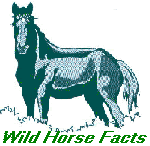LRTC Wild Horse Mentors'
|

|
|
John Sharp of Prineville, OR at age 88 still puts in a full day on the training floor. John has been gentling and training horses longer than the workshop participants have
been alive.
John proves the theory that experience, wisdom and common sense are far more important than muscle when working wild horses. John is a gentleman in every sense of the word and both horses and burros respond very well to him. |
John tying a squaw halter
|
|
John developed the method of using a bamboo pole to make contact with the horse and desensitize him to being approached and contacted all over his body. The mare in the first set of images is getting used to being touched, and the scratches from the pole actually feel pretty good. (A more complete description of the bamboo pole method is available
here.)
|
First contact with the pole
|
Scratching with the pole
|
Getting to the scary places
|
| Once a horse has been desensitized and is relaxed around humans it can handle all sorts of things, as this mare demonstrates on her fourth session of being worked. | |
Letting the horse see the pack saddle
|
Discussing the order of events with a student
|
|
John has proved him self invaluable to not only the workshop but to the science of developing ways that ordinary people can achieve extraordinary results with wild horses and burros.
John also donated his trademark hat to the workshop's silent auction. It brought over $100.00! |

|
| Wild horses primarily eat grasses and don't compete for food directly with most native species. In some areas the horses actually help control grass growth which benefits other plant communities and the animals which feed on them. |
Continue to Part Five
Return to Part Three









